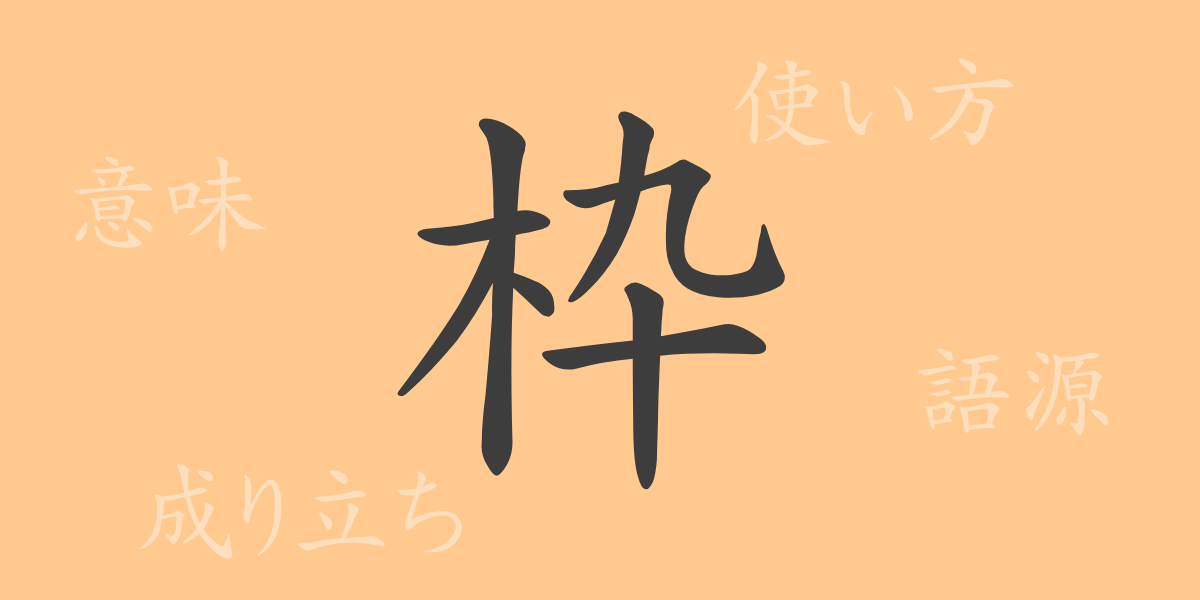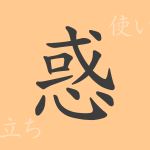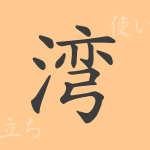Kanji (かんじ) are indispensable elements of Japanese culture and language. Among them, “枠 (わく, waku)” is one of the kanji deeply rooted in our daily lives and society. In this article, we will delve into the origins, meanings, usages, readings, stroke count, and radicals of the kanji “枠 (わく, waku).” Additionally, we will explore idiomatic expressions, phrases, and proverbs that incorporate “枠 (わく, waku).” Embark on a journey to rediscover the profoundness of the Japanese language through the diverse aspects of “枠 (わく, waku).”
Origins of 枠 (わく, waku)
The origins of the kanji “枠 (わく, waku)” trace back to ancient China. It is believed to be a combination of “木 (き, ki),” meaning wood, and “匚 (ほう, hou),” which signifies shaping. Originally, it referred to “frameworks” made from processed wood such as boxes or enclosures. Over time, it has come to denote not only physical frames but also abstract boundaries and ranges.
Meanings and Usages of 枠 (わく, waku)
“枠 (わく, waku)” has multiple meanings. One is a physical “framework” or “border,” and another is a metaphorical sense indicating “range” or “limit.” Its usages span various contexts, such as “window frame” or “door frame” in construction, “framework” in organizations or systems, and “time frame” in terms of time or rules.
Readings, Stroke Count, and Radicals of 枠 (わく, waku)
The basic information about the kanji “枠 (わく, waku)” is as follows:
- Readings: The onyomi (音読み) is “ワク (わく, waku),” and there is no specific kunyomi (訓読み).
- Stroke count: It has a total of 8 strokes.
- Radical: The radical is “木 (き, ki),” categorizing it among kanji related to wood.
Idiomatic Expressions, Phrases, and Proverbs Using 枠 (わく, waku)
Here are some idiomatic expressions, phrases, and proverbs that include “枠 (わく, waku)”:
- “枠組み (わくぐみ, wakugumi)”: The basic structure or system of something.
- “枠外 (わくがい, wakugai)”: Being outside a certain range or condition.
- “枠組みを作る (わくぐみをつくる, wakugumi o tsukuru)”: To establish the basic plan or rules of something.
- “枠にはまる (わくにはまる, waku ni hamaru)”: To conform to established concepts or norms.
- “枠にとらわれない (わくにとらわれない, waku ni torawarenai)”: To think freely without being bound by fixed ideas.
Summary of 枠 (わく, waku)
The kanji “枠 (わく, waku)” encompasses a wide range of meanings, from visible physical frameworks to invisible social and psychological boundaries. This kanji, frequently used in the Japanese language, symbolizes both “limits” and “possibilities” in our thoughts and actions. By being conscious of “枠 (わく, waku),” new discoveries and creativity may arise. The next time you encounter “枠 (わく, waku),” try to sense the deeper meanings it holds.

























